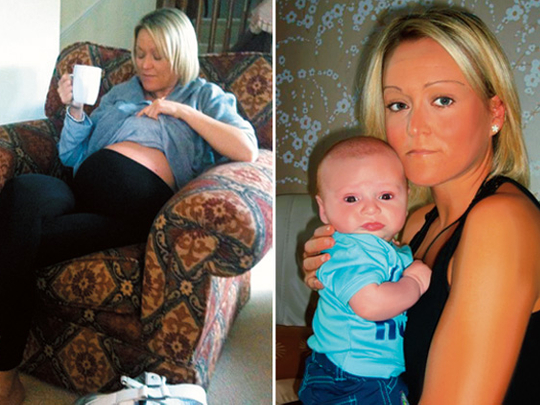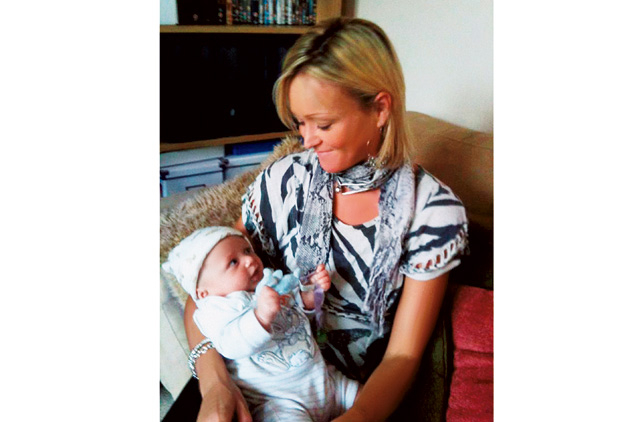
Wincing, I tried not to let the pain show. I’d been in labour for 12 hours at home with my first baby and was trying to remember everything I’d learnt at antenatal classes. "Breathe deeply," my boyfriend Tony reminded me as a contraction hit. I paced the room, but the pain felt different now. "Let’s go to hospital," I said. We didn’t live very far away, but I wanted to make sure I was in safe hands. Tony nodded, and, grabbing my hospital bag, helped me to the car. Tony, 26, drove gently but I could feel every bump on the road. "Are you alright?" he asked, and I nodded.
"Don’t worry," I reassured him. "I have a high pain threshold."
I never took headache tablets. And I’d twice had pre-cancerous cells removed from my cervix while awake. So I walked into the hospital, and sat chatting normally between contractions when the midwife showed us into a side room.
It was 9.50pm, the day before my due date. A midwife examined me at midnight. "You’re 6cm dilated," she said. "It’ll be a while yet."
A contraction crashed through my insides. "Ouch, that one hurt," I said through gritted teeth. It was time for some pain relief, I decided, asking for gas and air. The pain subsided once I’d taken that and three hours later I had the urge to push. "Our baby will be here soon," I thought, bearing down. But 40 minutes later, I was exhausted – and the baby hadn’t budged. An hour passed, then another and I was growing anxious as well as exhausted.
"I need something stronger for the pain," I begged, and the midwife offered to organise an epidural, which would numb me from the waist down. It was quite fiddly to administer, but once it was done, my legs went numb and the pain vanished. I tried to deliver the baby naturally again, but eventually my consultant decided I needed medical help in the form of a ventouse. It was a special cap that would be fitted on the baby’s head to suction it out, but would have to be done in theatre.
I was prepared and wheeled down, while Tony put on the scrubs handed to him.
"You look like someone from ER," I said.
The doctors tried to deliver the baby using the ventouse.
I wasn’t in any pain but I could feel a strange pressure. Then someone shouted: "The baby’s in distress. The heart rate is plummeting."
The doctor ordered a Caesarean and the staff started rushing around.
Everything was a blur
I didn’t panic. I was too tired and just wanted my baby in my arms. I think I signed a consent form, but everything was a blur. My epidural was topped up as it had been four or five hours since it was put in.
The anaesthetist sprayed my chest, and my shoulders with a cold liquid to check what
I could feel and what I couldn’t. "Can you feel that?" he said and I nodded. "And that?" he asked, spraying between my breastbone. I was about to say yes, but he’d already turned to the surgeon. "Continue," he said. As I opened my mouth to speak the surgeon made an incision into my stomach and I was overwhelmed with pain. "I can feel everything," I realised in horror. "The epidural’s not working."
I was being cut open without any anaesthetic but couldn’t let them know. It was like I was being stabbed over and over. I tried to breathe, to scream or speak, but my voice caught in my throat. My legs began to shake with the pain. My insides were being tugged and pulled and tears streamed down my face. I could feel every cut and slice of my Caesarean.
The pain was getting stronger. I was sure my body was convulsing. I focused on breathing. "In... out... I’m not going to die here," I told myself. It worked and suddenly I could gasp air again. Everything was happening in slow motion and raw pain was exploding through me. I was terrified, and needed someone to know what was happening. So I tried to block out the pain, and suck in as much air as I could.
"Help," I croaked. My voice wasn’t even a whisper and no one reacted. I had to try harder. So I took another breath and spoke as I exhaled. "Help, I can feel it," I said. I was louder this time. Tony glanced down at me. I saw fear hit him as he saw my face and understood.
"Stop," he shouted. "She can feel it."
The anaesthetist hurried over to me and I could feel a cold liquid being pushed into the back of my hand. "Medication to block the pain," I thought, hoping the pain would vanish.
But I could still feel everything. Tony looked as terrified as I felt and I was screaming now. "Please knock me out," I begged.
But the surgeon was delivering our baby and I felt every tug as it emerged. "Help me,"
I screamed while Tony held my hand and looked over the screen to see our baby. There was silence and then everything went black...
Tony thought that I was dead
When I came round I was in a hospital recovery room. My stomach was sore. There was thick bandaging across my Caesarean wound.
"Where’s my baby?" I shouted, bursting into tears. "Is it alive?" There was no sign of Tony. Where was he?
The nurse was talking to her colleague about her holiday. "Please, where’s my baby?" I wept, but she didn’t know anything. "Just relax, we’ll take you to the ward soon," she soothed. How could I relax?
I lay, drowsy from the anaesthetic and desperate to know what happened. I dozed off and when I woke up again, Tony was there, holding our baby. "Oh thank goodness," I said, reaching for them.
He was red-eyed too. "I thought you were dead," he said, trembling.
He’d been asked to leave the theatre when I’d been given a general anaesthetic. He’d waited for three hours, holding our little boy, but didn’t know what had happened to me. "It’s OK now," I said, taking our baby. He was gorgeous. "I have to feed him," I said, numb. But as I held him I couldn’t stop crying.
I’d expected this rush of love for him, but it was like I was looking at him through a pane of glass. I knew I loved him. I just couldn’t feel it.
"I’m so tired," I told Tony back on the ward, but every time I closed my eyes, I’d have a flashback to lying on the operating table and feeling them cutting me open. I couldn’t forget that pain. And when I did doze off, I’d try to claw at my Caesarean wound.
I longed to go home with my son
The next day, the bandage was taken off and I winced. The stitches were so tight they hurt. "Is that normal?" I asked and the midwife nodded.
I was tired, exhausted and was still in pain.
I cried almost all of the time. I’d only nap when Tony was next to me, looking after our baby, who we named Jack. I told the midwives why I was so upset but no one came to offer me counselling or apologise.
"I just want to go home," I told Tony. After three days, I’d had enough.
Back home, I stayed in bed with the baby. My wound hurt too much to get up, and I had flashbacks and nightmares, and when I tried to get up, I collapsed. Luckily, Jack was in his Moses basket, but I was terrified. My heart was racing, and so I called an ambulance. Paramedics gave me oxygen and said I needed to go to hospital – the same one where the epidural had failed.
"I don’t want to go," I insisted but they said I needed tests.
At the hospital, doctors discovered I was anaemic and my wound was infected. I needed antibiotics and bed rest, but I was scared of being left alone there. "Don’t go," I’d beg Tony every night. I was so exhausted but I was frightened to close my eyes.
In my dreams I could smell the theatre, feel that pain, and I’d wake up screaming.
"I just want to go home," I told the doctors. Eventually, they discharged me. I thought I’d feel better in my own flat. But the baby had colic, and wouldn’t stop screaming. I couldn’t sleep and was in tears most of the time. I went to see my GP, who diagnosed post natal depression and post-traumatic stress disorder. He put me on medication but I still dreaded going to sleep.
That was over 18 months ago now, and even though I recovered physically from the Caesarean it’s still very tough mentally. I think about what happened every single day, and have nightmares most nights. I used to want a big family but I will never have another child.
I couldn’t risk that happening to me again.
I’m now terrified of hospitals, can’t sleep properly and it has taken me a long time to bond with my gorgeous little boy, who’s now 21 months old. He’s a happy baby with the biggest grin. I didn’t sue the hospital as I don’t want to go back over what happened. I want to move on.
I thought having a baby would be the best thing that could ever happen to me but the birth became a nightmare – one I don’t think I’ll ever forget.
A spokesman for East Sussex Hospital Trust said: ‘Senior clinicians have met with Miss Wingrove to discuss her concerns about the birth of her baby.
‘Miss Wingrove was given an epidural, which provided good pain relief for her labour. However it did not provide sufficient pain relief for the Caesarean section.
‘For the welfare of the baby it was decided to deliver her baby quickly and then Miss Wingrove was given a general anaesthetic. We are sorry her experience was not as we would have liked but everything was done correctly to ensure the positive outcome of a healthy baby once it was known the epidural was not taking full effect.’
How does an epidural work?
Medication is delivered through a catheter – a thin hollow tube – into the epidural space just outside the membrane that surrounds your spine. Doctors can adjust the dose so that you still have some sensation, though no pain, for a natural delivery, or give a higher dose, so women don’t feel anything during surgery. Epidurals are given to a third of pregnant women in labour, and work by numbing the nerves to block the pains of contractions. Epidurals can go wrong if the catheter is not sited within the epidural space correctly, the patient’s anatomy is problematic, or a woman’s labour progresses quicker than the anaesthetist expected.
Anna Wingrove, 30, Eastbourne, East Sussex, UK












